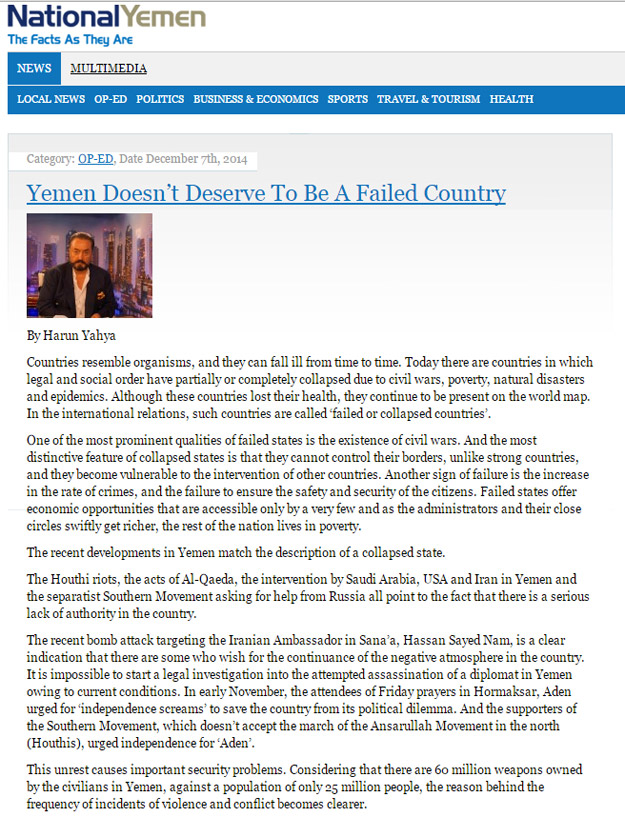Bigotry: The Dark Danger
Yemen doesn’t deserve to be a failed country

Countries resemble organisms, and they can fall ill from time to time. Today there are countries in which legal and social order have partially or completely collapsed due to civil wars, poverty, natural disasters and epidemics. Although these countries lost their health, they continue to be present on the world map. In the international relations, such countries are called ‘failed or collapsed countries’.
One of the most prominent qualities of failed states is the existence of civil wars. And the most distinctive feature of collapsed states is that they cannot control their borders, unlike strong countries, and they become vulnerable to the intervention of other countries. Another sign of failure is the increase in the rate of crimes, and the failure to ensure the safety and security of the citizens. Failed states offer economic opportunities that are accessible only by a very few and as the administrators and their close circles swiftly get richer, the rest of the nation lives in poverty.
The recent developments in Yemen match the description of a collapsed state.
The Houthi riots, the acts of Al-Qaeda, the intervention by Saudi Arabia, USA and Iran in Yemen and the separatist Southern Movement asking for help from Russia all point to the fact that there is a serious lack of authority in the country.
The recent bomb attack targeting the Iranian Ambassador in Sana'a, Hassan Sayed Nam, is a clear indication that there are some who wish for the continuance of the negative atmosphere in the country. It is impossible to start a legal investigation into the attempted assassination of a diplomat in Yemen owing to current conditions. In early November, the attendees of Friday prayers in Hormaksar, Aden urged for ‘independence screams’ to save the country from its political dilemma. And the supporters of the Southern Movement, which doesn't accept the march of the Ansarullah Movement in the north (Houthis), urged independence for ‘Aden’.
This unrest causes important security problems. Considering that there are 60 million weapons owned by the civilians in Yemen, against a population of only 25 million people, the reason behind the frequency of incidents of violence and conflict becomes clearer.
Armed groups raid military bases, arm their supporters and sell some of the weapons they seize. For this reason, there are almost two weapons per person in the country. Guns are so easily accessible that the weapons trade is now almost as prevalent as gas trade.
All these developments drag Yemen into a downward spiral of economic failure and instability. The economic problems Yemen has been suffering since 2011 make the people poorer who already had a very low purchasing power. Due to the long-running negative atmosphere in the country, food prices go up as the markets, groceries and supermarkets suffer from a lack of demand.
The predictions that political instability will continue and the fact that inflation went up to two-digit figures for the first time this year add to the pessimistic outlook. The purchasing power per capita in Yemen is only four US dollars and although this is significantly lower compared to the international figures, it has the danger of falling further still. It is because there is great price pressure on basic food items and the foreign investments stopped. As the population continues to rise, the rate of unemployment increases incessantly.
All these are among the challenges that the new Cabinet led by Bahhah is facing. Clearly, great efforts are required to solve these problems and it is crucial that Yemen focuses on works to rebuild the weakened authority of the state.
The way to establish that authority is for everyone to believe in democracy and to respect one another’s rights and those people elected to office. Once unity is established with the opposition with the country’s interests being observed, when a conception of government is developed that includes and embrace people from all sections of society, the process of resolving the problems in the country will begin.
Peace and order in Yemen can be established only through implementing the demands of democracy and through everyone living in Yemen, be they Sunni or Zaydi, respecting and trusting the state and all its institutions.
Of course, when the people build a society in compliance with Qur'anic morals, peace will come automatically. In such an environment, people will stay away from all sorts of anarchy and terrorism and act as one in the interests of the country, even if their opinions differ.
What needs to be done in Yemen is to avoid any course of action that might lead to turmoil. In the Qur'an, God commands people to refrain from causing problems:
… Eat and drink what God has provided and do not act wrongfully in the land, spreading corruption. (Surah al-Baqarah, 60)
Adnan Oktar's piece on National Yemen:
http://nationalyemen.com/2014/12/07/yemen-doesnt-deserve-to-be-a-failed-country/
2014-12-14 01:43:31

